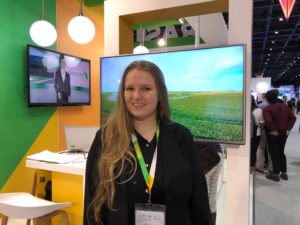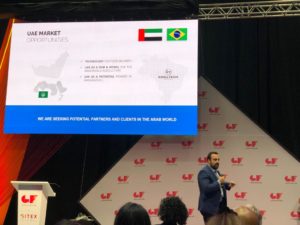Dubai – Two agriculture technology startups stood out in the latest edition of GITEX Future Stars, a startup exhibit that took place earlier this week in Dubai, United Arab Emirates. Raks and Krilltech were shortlisted for the Supernova award, where startups from all over the world competed. They were both showcasing their services in Brazil pavilion at GITEX, which featured eight other companies – Biosolvit, TNS Nano, Trakto, Dersalis, Jade Autismo, Tactic Up, Predify, and Asel Tech.
ANBA interviewed Raks CEO and founder Fabiane Kuhn during the exhibit. Kuhn said that Raks developed an irrigation control system. “We work with solar-powered fixed moisture sensors, without the need for internet in the field,” Kuhn said. These sensors monitor moisture and are coupled with weather, plant, and irrigation method data, in order to tell the farmer when and how much they must irrigate, thus saving power and water and boosting productivity.

Kuhn said the sensor is 25 centimeters deep underground, which is the average root size of several cultures. Wheat, soy, maize, açaí, strawberry and pecan are some of the crops the sensor has been used with. “And pecan is a tree, which shows the sensor can be used in different crops,” the CEO said. The sensor does not work with deep-water cultures like rice.
The technology is present in Brazilian states of Rio Grande do Sul, Minas Gerais, Mato Grosso do Sul, Bahia, São Paulo, and Pará. The company started as a high school research project developed by Kuhn together with two classmates. In 2017, the company opened with a focus on developing the product. It launched in 2020 for field tests, and sales started in 2021.
On Raks platform, the user can access all information the sensor collects in the field. You can see the history, recommendations as when and how much to irrigate, and forecasts for the following days and weeks. “On the platform you set which kind of soil and culture you have so that the system always suits your particular situation and does not use general information,” Kuhn said.
On being shortlisted for Supernova Challenge, Kuhn said that 500 companies from all over the world registered, 120 went to semifinals, and 22 to the finals. “The entire world is showcasing startups from different industries, and in our first time here, we managed to go to the finals, so we are representing Brazil really well,” she said. She aims to increase operations and fast-track the company’s process as a whole.

ANBA watched the presentation of Krilltech at the finals of the Supernova Challenge. CEO Diego Stone delved into the nanotechnology of arbolina, which boosts productivity in the crop and sustainably increases the nutritional quality of cultivars in the same time window.
The biofertilizer boosts the performance of crops without producing toxic residues. Arbolin Biogenesis is an innovative line of organic, non-toxic, biocompatible nanostructure products. Biodegradable, it acts as a fertilizer, biofortifier, and nutrient carrier, and it has saw an increase in productivity of over 23 different cultures, including strawberries (70%), beans (33%), tomato (26-40%), and greens (30-50%). Startup Krilltech is a partnership between state-run agricultural research agency Embrapa and the University of Brasília (UnB).
Stone said the company has had over 210 clients within six months and is on the lookout for potential partners and clients in the UAE and the Arab world. He says his product can help in the issue of food security, which is very dear to the Arabs of the Gulf.
Translated by Guilherme Miranda




